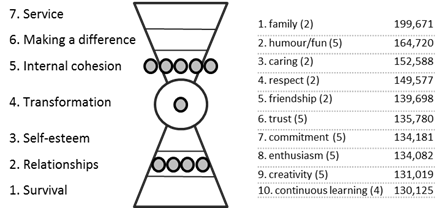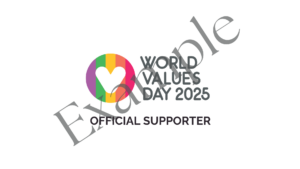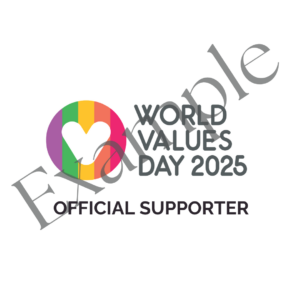Who are we collectively?
By Richard Barrett, Chairman and Founder, Barrett Values Centre
Where are we as a human race in terms of our development? What do we value? What levels of consciousness do we mainly operate from? To answer these questions, at least in some general way, I have analyzed the results of half a million Personal Values Assessments.
The top ten values of this group of half a million people are shown in Figure 1 along with the number of people who chose each value as one of their ten most important values. Figure 1 is a visual representation of the Seven Levels of Consciousness model. Each shaded dot represents one of the values listed alongside the diagram. The level of consciousness is indicated in brackets, for example, family, caring, respect, and friendship are found at the Relationships level (Level 2) and continuous learning is found at the Transformation level (Level 4).
It is interesting to note that four of the top five values are located at the
Relationships level (Level 2) and all the other values are located at the Internal Cohesion level (Level 5) except continuous learning, which is located at the Transformation level.
Figure 1: Top ten values of half a million people

After downloading the data for the half a million people, I fed the top ten values back into the Personal Values Assessment as if they were a single individual, and this is the report I got.
From the values you selected it is clear that you are a person for whom meaning is important. You have a strong set of moral standards which are important in how you treat others and how you wish to be treated.
Your values show:
- Having meaningful close relationships with others is important in your life and is central in the decisions you make.
- Living with a passionate and an upbeat, fun-loving approach is important to you.
- Relationships are a central focus in your life, and you show concern and consideration for those around you.
- You demonstrate dedication in all that you do.
- Seeking new opportunities to develop and grow keeps you constantly challenged.
- You can think imaginatively and use your skills to produce new ideas.
- Building confidence in others and wanting others to feel they can rely on you are key factors in your interactions.
The type of values you selected indicates that the connections you build with others and your capabilities are equally important to you.
I believe this value profile tells an interesting story about humanity in general:
-
- Five of the top values are about how we relate to the people in our lives—family, caring, respect, friendship, and trust. This suggests that inter-personal safety is a fundamental priority for most people. Historically, personal safety has always been linked to belonging and identity.
- Five of the top values are about how we relate to ourselves (who we are)—humour/fun, enthusiasm, commitment, creativity, and continuous learning. This suggests that self-expression is also a fundamental priority. However, the results indicate that we prioritize inter-personal safety over self-expression. Only when we feel safe do we feel free to express who we are.
- This suggests that Maslow’s theory is correct. We prioritize safety—a deficiency need over self-actualization—a growth need. Furthermore, the ability to develop and grow through continuous learning is of significant importance to us.
Conclusions
We cannot grow and develop unless we feel safe. Once we feel safe, then selfrealization becomes our main priority. If we want to build a positive future for everyone, we must create the conditions in our society that allow people to feel safe, especially our children, and support everyone in their selfexpression. Feeling safe is intimately linked to belonging and belonging is intimately linked to identity.






